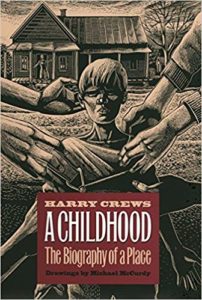
I wrote a piece on Grit Lit a little over a week ago. And then I ordered from amazon a used copy of Grit Lit: A Rough South Reader, edited by Brian Carpenter and Tom Franklin, and as soon as I got it I read Franklin’s preface, and immediately I thought Shit, man, I don’t know doodly squat about this stuff. Where do I get off writing about it like I know what I’m saying.
I read the preface and just the first few pages of From A Childhood: The Biography of a Place by Harry Crews. And then I forced myself to put the book aside because I was halfway through with Margaret Atwood’s Cat’s Eye (which is entertaining but nowhere near as good as my favorite Atwoods, Handmaid’s Tale and Oryx and Crake), and my good friend the poet Larry Johnson had recently given me a copy of Mishima Aesthetic Terrorist: An Intellectual Portrait by Andrew Rankin,a book about the enigmatic Japanese writer who committed ritual suicide. I promised myself I would finish Cat’s Eye and read Mishima before tackling Grit Lit.
But I did read enough of From Childhood to come across this:
“Did what I have set down here as memory actually happen? . . . I do not know, nor do I any longer care. . . . They are true because I think they are true. . . . Nothing is allowed to die in a society of storytelling people—carted up and brought along from one generation to the next. And everything that is brought along is colored and shaped by those who bring it.”
I think Crews was speaking for all southern writers when he wrote that, and maybe not just southern. It certainly sounds like me and my dependence on and tweaking of memory. The only difference between us (other than Crews’s success and my lack thereof) is that he lived a much more down-and-dirty, rough and story-worthy life, while I grew up the epitome of a well-loved, middle class white boy.
From the description on amazon: “Crews was born in the middle of the Great Depression, in a one-room sharecropper’s cabin at the end of a dirt road in rural South Georgia. If Bacon County was a place of grinding poverty, poor soil, and blood feuds, it was also a deeply mystical place, where snakes talked, birds could possess a small boy by spitting in his mouth, and faith healers and conjure women kept ghosts and devils at bay.” I heard about a lot of that kind of stuff when I was young, but I never lived it.
Grit Lit is chock full of memoirs and stories by such great writers as Dorothy Allison, Larry Brown, Barry Hannah, Crews, and many more. You could hardly go wrong by ordering it or, for that matter, by ordering anything by that cadre of writers.
